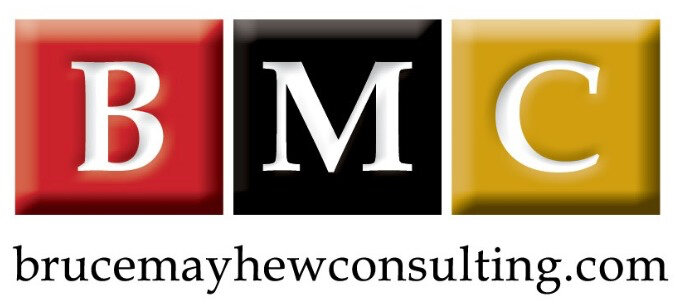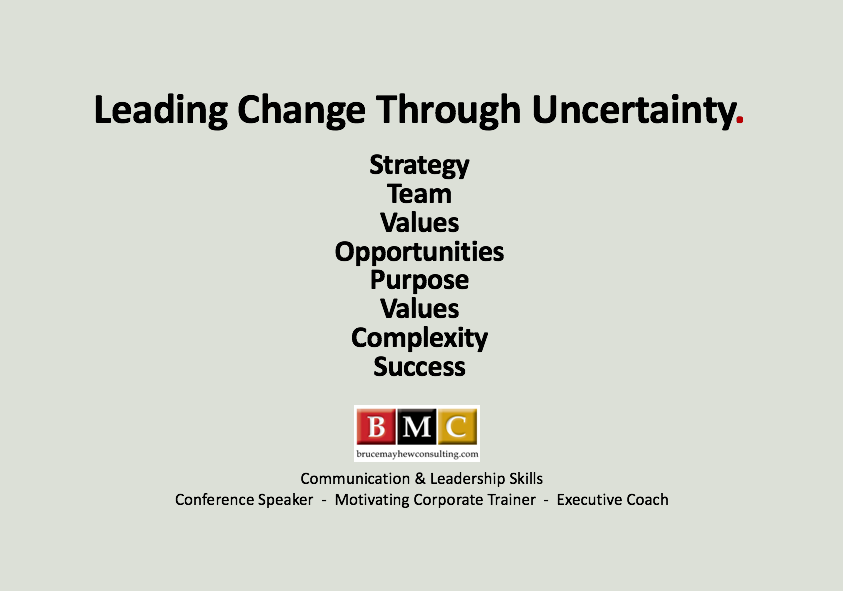Leading Change Through Uncertainty
/All of us have a love hate relationship with change. Behavioural Scientist have demonstrated we love change when we when we get a new car or upgrade our smartphone and have an understandable aversion to change when it upsets our routine, our security and/or when it happens suddenly. We are certainly experiencing change that is upsetting our business and how our teams are feeling and working.
In her book ‘The Psychology of Fear in Organizations’, author Sheila Keegan explores fear at work and leadership. Yet it’s fair to say that as a leader who is dealing with the challenges the COVID-19 Pandemic is creating, it is more critical than ever you hold your team together and guide them – and your business to success. As a corporate trainer, keynote speaker and executive coach specializing in leadership, team motivation and soft-skills I am happy to share a few recommendations leaders like you can use when leading change through uncertainty.
Face The Challenge Head-On
It is temporarily comforting to pretend change isn’t happening. If members of your team try to keep everything as it was they’ll soon find themselves standing alone. Even in less critical times the one truth about change is that it is always present and very persistent.
When faced with uncertainly people will undoubtably be exploring and likely grieving the loss they may face – everything from their job to their own sense of worth and value. Make sure your team members know how important they are to you, the team and the company.
There will be bumps, bruises and compromises that everyone is going to have to experience or make; especially if change is sudden and you are in ‘reaction mode’. Still, encourage everyone to see change as glass-half-full not glass-half-empty. Change can be an exciting growth opportunity for your organization and for your team members, both personally and professionally.
Your job as a leader is to help your team face the challenge head-on and give them some comfortable footing. Help your team accept that together you are moving into a new normal and yes, the new normal is still unclear. Encourage them to see the details of your business have changed which means the details of their work has changed. Flexibility and adaptability are now critical moving forward.
Give Your Team A Foundation
Remind your team of your mission, vision and values. In times of uncertainly your vision may need to be adjusted but in most cases your mission (why your business exists), and especially your values (your guiding principles), should stay quite steady. Your mission, vision and values are amazingly important because they provide you and your team a stable foundation everyone will be able to count on for inspiration and consistent direction for everything they say, everything they do and ever decision they make.
Communication is critical here. As the leader be sure the scope of each person’s responsibilities are clearly defined (verbally and in writing) and in line with the organizations mission, vision and especially values. It’s important to remember people communicate and respond to interactions differently—you need to ensure you’re sharing information in a way that resonates with them, and through a channel they’re comfortable using.
Note, I think it is important to point out that up to now we’ve explored solutions based in using soft-skills and emotional intelligence. This is important because how people respond to change and uncertainty is often highly emotional – and if managed well they can set a positive tone to how and why a team will commit themselves and work together.
Share Responsibility
It’s completely natural for leaders who are facing uncertainty to take greater control of all decisions – to close ranks so to speak. Fight against this nature tendency – don’t become a bottleneck. Your team has amazing experience and education; be sure you benefit from it. If you take control over every decision you will be isolating important decisions from their experience and creativity and perhaps worst of all you will be stifling your team members sense of value and purpose.
There are a few places where a leader needs to take full control. For example, be unyielding about your organizational values. Be resolute about frequent communication and transparency. Be consistent about making sure everyone has the resources and support they need and feel valued. If you feel you must be involved in every decision, it’s very likely you need to do some changing of your own.
Give Your Team Focus
Focus your teams in two places at the same time. Some of your team members are experts at yesterday; it might be managing client relationships, payables and receivables or production. It’s also likely some of your team members are great at innovation and at looking into the future which may include people managing client relationships but also sales, service and if you have a new product development area. While one group stays in contact with your core clients and suppliers – demonstrating your organizational values, your other team searches for a way forward based on your businesses core competencies and, you guessed it… values.
Delegation and empowerment are critical in times of change. Be sure you benefit from your teams’ experience and education. Make sure you are taking advantage of their creativity and most importantly, not stifling everyone’s sense of value and purpose.
This may sound like two directives, but it is not. There can only be one plan and everyone at the senior level must support a focused goal of finding a new normal and migrating your mission, vision, values and operations to fulfilling that goal. As a leader your job is to keep these two groups empowering each other and working toward a new future. Everyone’s expectations – from the most senior to the most junior employee must be managed by clearly defining (verbally and in writing), the scope of each position’s responsibilities.
Conclusion
According to Gerd Leonhard, a speaker, author and one of the world’s most prominent futurists, “There will be more changes in the next 20 years than in the previous 300 years.”
If we ever needed to be nimble and agile it is now and as leaders we have to help our teams do the same. Moving forward there will always be a need for change within ourselves, our team and our organizations; this is true even if we were not experiencing the COVID-19 Pandemic. By training ourselves to both think strategically and to be the coach that our teams need will mean we will always be ready to lead change through uncertainty while also being the empowering support system they need for us all to experience continued success.
Thank you for reading Leading Change Through uncertainty. If you have questions please let me know.
Bruce
Suggested Additional Reading: ‘Switch’ by the Heath brothers is an excellent book on change and how we all dislike it.
About Bruce and Bruce Mayhew Consulting.
Bruce is Corporate Trainer, Keynote Speaker and Executive Coach.
As a Corporate Trainer Bruce Mayhew (of BMC) specialize in customized Time Management Training, Email Etiquette Training, Leadership & New Leadership Development, Generational Differences and other soft skills training solutions in Toronto and across Canada. Bruce is also an Executive Coach to a few select clients.
BMC helps your greatest assets think productive and be productive.
Bruce is an experienced motivational speaker in Toronto and has inspired audiences across Canada and within the USA and the UK. Bruce works hard to always make sure your training event, conference, retreat, or annual general meeting is a success.




